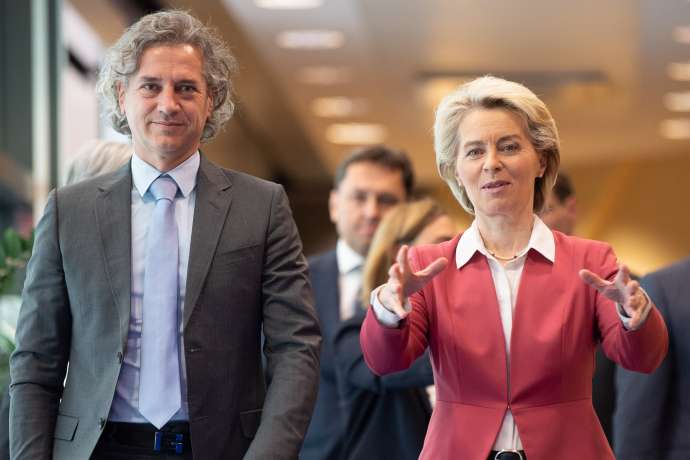STA, 16 June 2022 - Prime Minister Robert Golob expressed Slovenia's support for granting Ukraine status of a candidate for membership of the EU as he met European Commission President Ursula von der Leyen in Brussels on Thursday. He underscored the significance of the EU's unity in response to the Russian invasion of Ukraine.
"I expressed Slovenia's support for Ukraine to get candidate status. We confirmed this at the government session yesterday and I made this very clear," Golob told reporters after his meeting with von der Leyen.
Golob expects the Commission to give a positive opinion on granting Ukraine EU candidate status as it announces its position on Friday.
He acknowledged that Ukraine, Georgia and Moldova are under direct threat. "But things can turn around quickly and sometimes it's better to act preventively. In Slovenia, we believe the Western Balkans is a region that deserves a strong and ambitious European policy," he said.
He said Slovenia did not link the process of granting EU candidate status to Ukraine, Georgia and Moldova to the Western Balkans. However, "we would not want the region to be overlooked," said Golob, who is in Brussels on his first official trip abroad since his government was sworn in on 1 June.
Sogovornika sta se strinjala, da Unija pri naslavljanju aktualnih izzivov potrebuje enoten in odločen odziv ter da moramo biti glede energetske oskrbe in zelenega prehoda dovolj ambiciozni. pic.twitter.com/s4oettEOvs
— Vlada Republike Slovenije (@vladaRS) June 16, 2022
Slovenia does not intend to set any conditions for Ukraine to be granted candidate status, he said.
He underscored the need for EU's unity in its response to the Russian aggression against Ukraine. The unity already exists with regard to the need to support Ukraine and the inadmissibility of Russian's invasion.
"We need to work on this. Everything else is but nuances," Golob said about differing views on response to Russia's aggression emerging in Europe. One set of positions advocates starting peace talks as soon as possible, with the other warning against yielding to Russia.
In Slovenia positions differ as well and two groups of prominent figures addressed each their own letter to the government to present their views. The positions will be discussed in parliament.
Golob said talks were the only way out of the conflict. "Every war ends at the negotiating table. Peace talks don't mean conceding victory to the aggressor," he said.
Speaking about Slovenia's continued support for Ukraine, he said Ukrainian Prime Minister Denys Shmyhal had not asked him about weapons as they talked on Wednesday, but whether Slovenia could help in demining.
"Let's help where we can help and where help is wanted, and that is our position," he said. He also mentioned assistance by way of taking in refugees, patients and providing humanitarian aid.
He also discussed the matter with European Commissioner for Crisis Management Janez Lenarčič. In a Twitter post, Lenarčič welcomed "the reaffirmation of Slovenia's commitment to the fundamental values and the core EU".
Golob told reporters that the 24 April election marked an important turning point in Slovenia's foreign policy. "For us, Europe comes first. Slovenia has always been a core EU country and will remain so. And that is our basic message," he said.
Golob will conclude his first visit to EU institutions on Friday with a meeting with European Council President Charles Michel. In the morning, he is scheduled to meet representatives of the Renew political group in the European Parliament.







